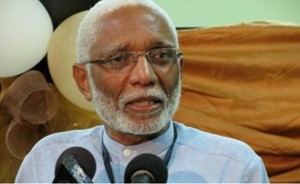“For in Him all things were created, both in the heavens and on earth, visible and invisible, whether thrones or dominions or rulers or authorities – all things have been created through Him and for Him” Colossians 1:16

“Where there is no vision, the people perish” (Proverbs 29:18). To have a vision is to set a worthwhile goal to move towards. It is to choose a world-and-life view from which one can understand and measure the events in one’s life. This vision, and personal conviction of the certainty of its ultimate value, helps one to go through the darkest moments with patience, hope and unfailing purpose.
Not to have a vision to guide one is to live under the power of passing incidents and other persons’ opinions and values. The present health crisis facing the whole world in such an unprecedented, unexpected, disturbing and anxiety-filled way will leave us in despair and without any hope if we do not have a personal world-and-life view that helps us to cope with and manage the fearful situation.
There are a variety of visions, including cultural, political, economic and religious. Many of these visions are rooted in a secular view, which denies the supernatural, the transcendent, the existence of God. To believe that man is a spiritual being, with an eternal destiny, is to be in opposition to materialistic or political philosophies that place their hope only in this world. Non-spiritual ideologies have validity and value in their context. Resolution of issues of racial and cultural identity, thought-through approaches to government, national development, ecological preservation are vital to our communal well-being on earth. These matters are discussed usually without reference to God.
But these cannot be our ultimate concern if we sense and understand ourselves as more than evolved animals in Nature. A spiritual vision envisages a Creator who loves humanity, provides for us and holds us accountable for our actions. Most religions and perennial spiritual philosophies share this idea.
The New Testament, the Christian Charter, rooted in the Old Testament, presents the resurrected, living Jesus Christ as the Certain Vision, “The Way, the Truth, the Life.” (John 14:6). He is proclaimed as “…the same yesterday and today and forever.” The Gospel, “Good News,” calls us to make Him the focus of our whole living. The Bible proposes that faith in Christ will provide an ordered progress (not without struggles, failures, resistance) that reaches beyond our short pilgrimage on this planet. To make Him the focus of our spiritual hope and human purpose is to understand where political, cultural, economic and even religious partisan considerations find their appropriate place.
The Gospel of Christ proclaims Him our All-Sufficient God-with-us (Emmanuel), Creator, the Saviour humanity needs, the King of all Kings, presidents and passing rulers, the coming Judge of this world. This Gospel has been from the first an amazing declaration and assertion by His followers. And it has been and still is, fiercely resisted and hated by a world that claims itself and its speculations as authoritative.
An objective look at the historical record of Christianity (I mean the Biblical theology of this faith, not the horrendous actions of “Christendom” and I make a distinction) will show that there is no vision so tested, assaulted and proven in the lives of its adherents as the vision of Jesus Christ. After meeting the risen Christ on the Damascus road, Saul the Christian hater can say, “For to me, to live is Christ and to die is gain.” (Philippians1:21.) Christ’s Deity and Resurrection, to which the Apostles give witness (Acts 10:40-43) and for which they gave their lives, is the foundation of the faith of His Church. “You are the Christ, the Son of the Living God.” (Matthew 16:16). To choose this Vision of Christ before all others is to accept the Bible’s teachings about us: that we are rebellious sinners, under condemnation, in need of reconciliation with God. It is to believe that Christ is the Redeemer and Saviour sent from Heaven that each of us needs.
How politically incorrect all this sounds in our pluralistic world! How incredible and nonsensical! How undemocratic! How narrow-minded! From its earliest days in Jerusalem and Rome and the world of that day, these confident affirmations of Christians have been rejected.
But the Christian faith (despite all the wrong that has been done in its name) has become an enduring religion, with a rational systematic theology that continues to change lives everywhere. To accept the authority of the Bible as the inspired Word of God is to make its teachings one’s guiding vision, is to submit to the authority of King Jesus (see Matthew 28:18) and to hope in its promises of a life beyond death in the “new heavens and new earth where righteousness dwells” (2 Peter 3:13). For believers this is not “pie-in-the-sky.” Through willing obedience of Scripture’s teachings, we lay claim to the inheritance of this vision of help, hope and certainty of eternal life set out in the Gospel of salvation.
We are not a theocracy but a democracy and persons are free to choose their visions, even one of nihilism and atheism. Surrounded by failed, confusing and contradictory philosophies, the Risen, Living, Lord Jesus Christ is a Certain Vision. He is a Certain Hope. Even more so today in these apocalyptic days of the deadly Corona Virus.
John Robert Lee is an Elder with the Calvary Baptist Church, Massade, Gros Islet. He is well-known as a Saint Lucian writer.





